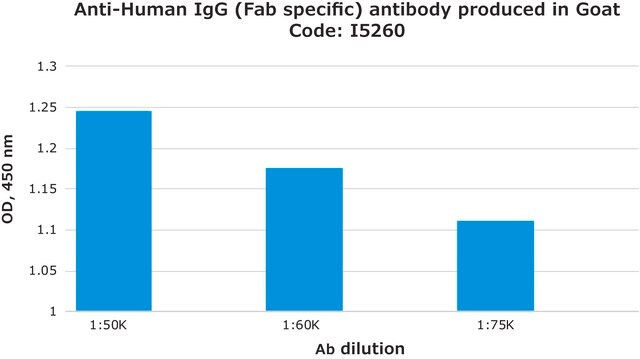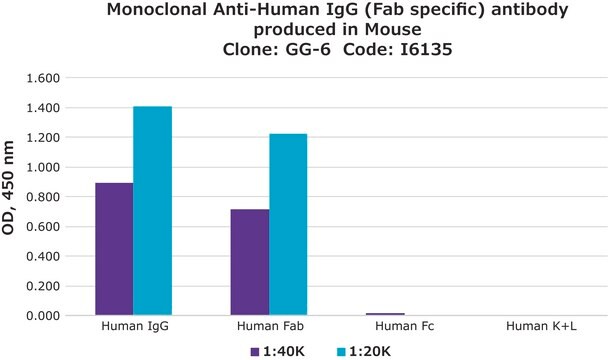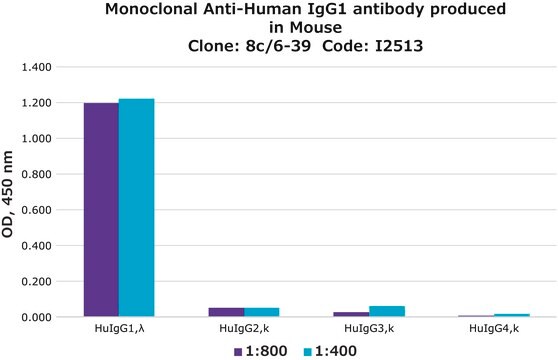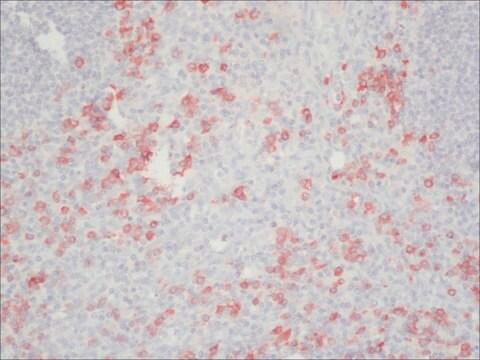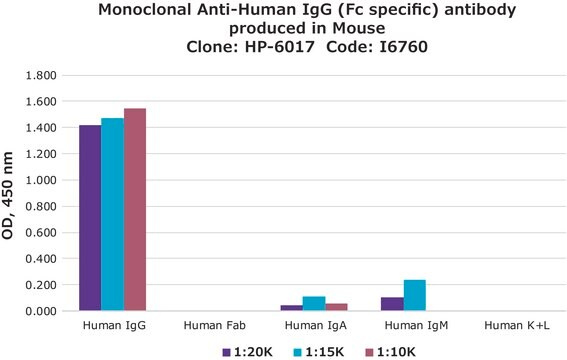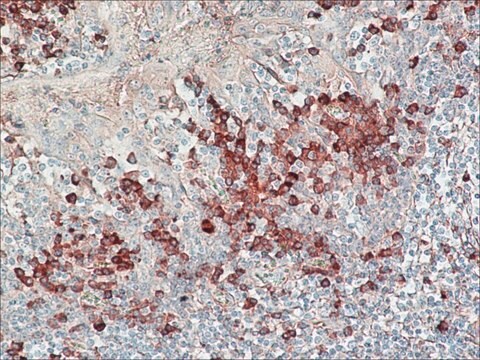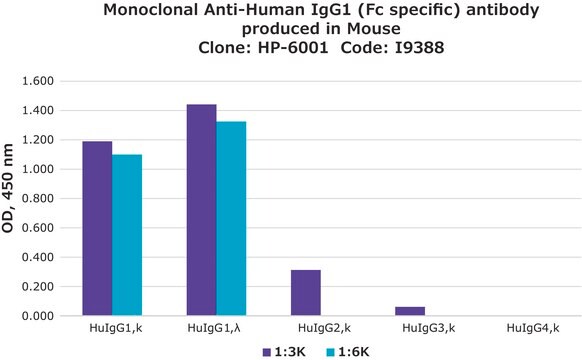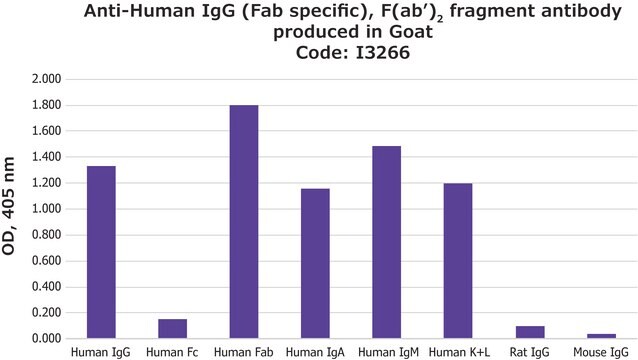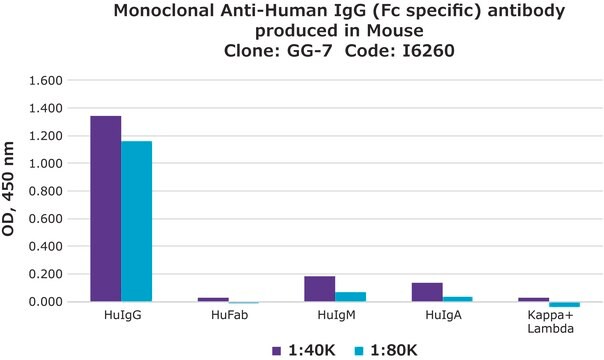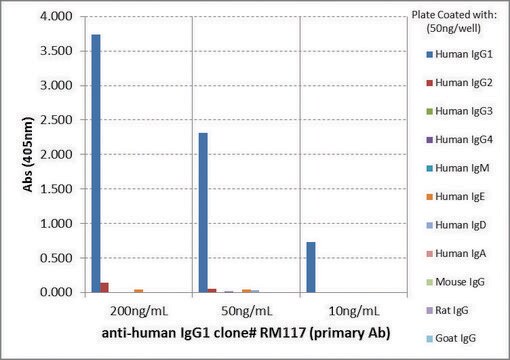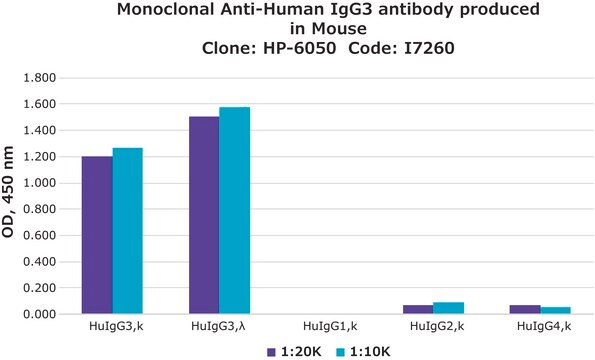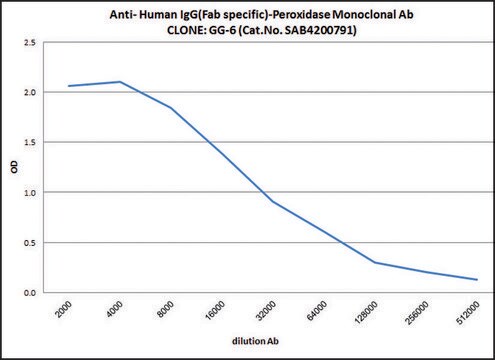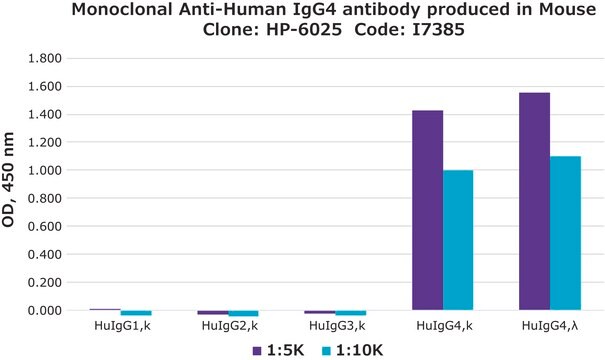I5385
Monoclonal Anti-Human IgG1 (Fab specific) [G1m(f)] antibody produced in mouse
clone SG-16, ascites fluid
Autenticatiper visualizzare i prezzi riservati alla tua organizzazione & contrattuali
About This Item
Prodotti consigliati
Origine biologica
mouse
Livello qualitativo
Coniugato
unconjugated
Forma dell’anticorpo
ascites fluid
Tipo di anticorpo
secondary antibodies
Clone
SG-16, monoclonal
contiene
15 mM sodium azide
tecniche
indirect ELISA: 1:5,000
Isotipo
IgG1
Condizioni di spedizione
dry ice
Temperatura di conservazione
−20°C
modifica post-traduzionali bersaglio
unmodified
Descrizione generale
Monoclonal Anti-Human IgG1 (mouse IgG1isotype) is derived from the hybridoma produced by the fusion of mouse myeloma cells and splenocytes from an immunized mouse. Human IgGs are glycoprotein antibodies that contain two equivalent light chains and a pair of identical heavy chains. IgGs have four distinct isoforms, ranging from IgG1 to IgG4.
Immunogeno
Purified human IgG
Applicazioni
Monoclonal anti-Human IgG1 may be used for the identification of human IgG1 subclass by means of various immunoassays. It can be used in direct hemagglutination (HA) and hemagglutination inhibition (HAI) assays, immunofluorometric assay (IFMA) and detection of cytoplasmic IgG. Monoclonal anti-human IgG1 has been used in enzyme linked immunosorbent assay (ELISA).
Azioni biochim/fisiol
Human IgGs regulate immunological responses to allergy and pathogenic infections. IgGs have also been implicated in complement fixation and autoimmune disorders This product clone recognizes the G1m(f) allotype and has been established as a useful human IgG1 specificity standard by the WHO/IUIS study.
Esclusione di responsabilità
Unless otherwise stated in our catalog or other company documentation accompanying the product(s), our products are intended for research use only and are not to be used for any other purpose, which includes but is not limited to, unauthorized commercial uses, in vitro diagnostic uses, ex vivo or in vivo therapeutic uses or any type of consumption or application to humans or animals.
Non trovi il prodotto giusto?
Prova il nostro Motore di ricerca dei prodotti.
Codice della classe di stoccaggio
10 - Combustible liquids
Classe di pericolosità dell'acqua (WGK)
nwg
Punto d’infiammabilità (°F)
Not applicable
Punto d’infiammabilità (°C)
Not applicable
Scegli una delle versioni più recenti:
Possiedi già questo prodotto?
I documenti relativi ai prodotti acquistati recentemente sono disponibili nell’Archivio dei documenti.
I clienti hanno visto anche
Allotype analysis to distinguish the origin of varicella-zoster virus immunoglobulin G after allogeneic stem cell transplantation
Yamazaki R, et al.
Biology of Blood and Marrow Transplantation : Journal of the American Society For Blood and Marrow Transplantation, 19(7), 1013-1020 (2013)
Andreas Lossius et al.
Annals of clinical and translational neurology, 4(10), 756-761 (2017-10-20)
Immunoglobulin gamma (IgG) heavy chain genes are associated with susceptibility to multiple sclerosis (MS) and IgG levels in the cerebrospinal fluid (CSF). However, how these variants are implicated in disease mechanisms remains unknown. Here, we show that proliferating plasmablasts expressing
Recurrence of monoclonal gammopathy associated with donor-derived myelodysplastic syndrome after cord blood stem cell transplantation
Yamazaki R, et al.
Experimental Hematology, 39(12), 1119-1123 (2011)
Virginie Martin et al.
Veterinary research, 45, 69-69 (2014-06-27)
Control of canine leishmaniasis is an important objective for the benefit of dogs living in or visiting endemic areas and for public health because of the zoonotic nature of this disease. Resistance or susceptibility to developing canine leishmaniasis after exposure
Rie Yamazaki et al.
Experimental hematology, 39(12), 1119-1123 (2011-09-14)
Myelodysplastic syndrome (MDS) is known to be associated with functional abnormalities of B cells, including hypergammaglobulinemia and monoclonal gammopathy (MG). However, the pathogenesis of these immunological disorders has not been clarified. We report a patient who developed donor-derived MDS followed
Il team dei nostri ricercatori vanta grande esperienza in tutte le aree della ricerca quali Life Science, scienza dei materiali, sintesi chimica, cromatografia, discipline analitiche, ecc..
Contatta l'Assistenza Tecnica.